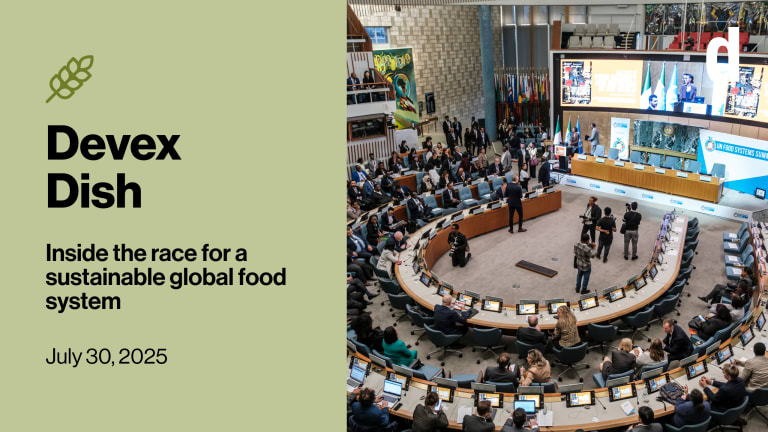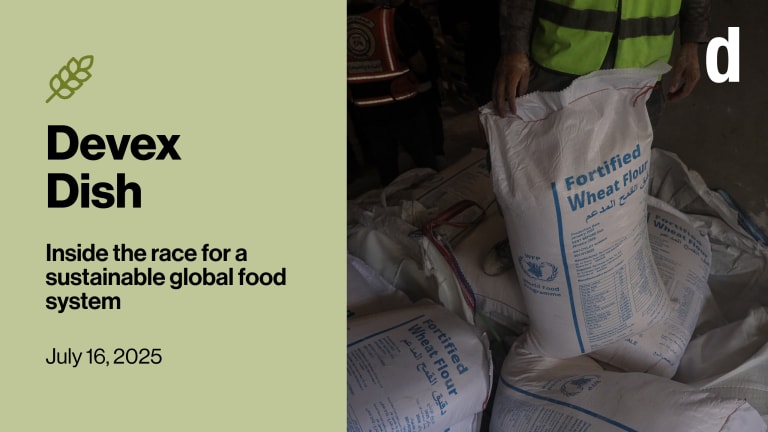
It’s hard not to let Vincent Doumeizel’s enthusiasm catch on when you speak with him about seaweed. Doumeizel, a senior adviser on oceans to the United Nations Global Compact, is a passionate proponent of the “seaweed revolution” — a global movement to sustainably scale up seaweed production to help meet the Sustainable Development Goals.
This is a preview of Devex Dish
Sign up to this newsletter to get the inside track on how agriculture, nutrition, sustainability, and more are intersecting to remake the global food system in this weekly newsletter.
He calls seaweed “the greatest untapped resource we have on the planet” and animatedly rattles off to me a list of the ways it can help the world solve some of the most vexing challenges: increasing food security; capturing carbon dioxide; creating economic opportunity for coastal communities, especially women; reducing the need for plastic when used in sustainable packaging materials — and more.
I’ll admit that before I reported this story, I hadn’t given much thought to seaweed aside from as sushi wrapping — or as the slimy stuff that grabs at your ankles when you’re swimming in a northern Minnesota lake. But Doumeizel’s Safe Seaweed Coalition is working to put the seaweed industry — which doubled in size from 2005 to 2015 — squarely on the global agenda, while avoiding practices of terrestrial farming that are environmentally damaging, such as monoculture.
The Our Ocean Conference is taking place this week in the island nation of Palau, and while seaweed doesn’t appear directly on the main agenda, members of the Safe Seaweed Coalition are at the event participating in another coalition on blue foods, which are food derived from aquatic organisms. Seaweed proponents have also seen promising progress with FAO, which for the first time this year will consider a working paper on seaweed in its Committee on Fisheries. If received favorably by member states, the organization could be given a formal mandate to incorporate seaweed into its agenda.
That mandate would make it “much easier for us to engage ourselves and engage interested parties in seaweed farming globally,” Alessandro Lovatelli, an aquaculture officer with FAO’s fisheries and aquaculture division, tells me.
Read: Can seaweed fix the food system? This global coalition thinks so
+ What do you think? Is seaweed a silver bullet that can help solve the world’s stubborn problems? Is there anything being overlooked? Share your thoughts with me at dish@devex.com.
Waste not
Russia is the world’s top exporter of nitrogen fertilizers and the second-leading supplier of both potassic and phosphorus fertilizers. Now, agriculture experts in Malawi say rising fertilizer prices — which they believe could triple because of the war in Ukraine — will have severe consequences for farming in low-income countries.
But some Malawian farmers, such as Sabawo Chikuni, are turning to organic fertilizers, made by a small “biodigester” that feeds human and other domestic waste from home sewage into the system. Chikuni says these have cut his costs by 80%.
“Producing these fertilizers is very cheap and cost-effective as it only involves the use of readily available recyclable resources,” says Chikuni, who has been using them for two years. He also creates bionitrate fertilizers from human urine.
Read: Malawian farmers turn to organic alternatives as fertilizer costs rise
Trust me
FAO’s Food Price Index hit its highest level ever in March, with the index for cereal prices up 17.1% from just a month earlier.
To fund some of the rising costs that will affect food security, Sarah Charles, assistant administrator at USAID’s Bureau for Humanitarian Assistance, told the House Agriculture Subcommittee on Livestock and Foreign Agriculture last week that USAID and USDA are considering how to deploy money from the Bill Emerson Humanitarian Trust, which is intended to provide flexible funding for responding to “unanticipated food crises abroad.” It grew out of a wheat reserve established by Congress in 1980 and hasn’t been tapped since 2014.
The House Agriculture Committee is also preparing for next year’s renewal of the farm bill, and Charles and representatives from NGOs made a hard sell for serious reforms to the legislation’s Title II. That provision governs U.S. foreign food assistance and requires it to be provided in the form of U.S. commodities, which don’t maximize resources due to high shipping costs. Charles said a mix of commodities and cash better utilizes taxpayer dollars, but Congress has found it tricky to vote for new terms that could end the provision’s benefit for U.S. farmers.
Meanwhile, leaders of the Senate Foreign Relations Committee are calling on the Biden administration to establish an interagency and international strategy for the U.S. to help mitigate the looming food security crisis.
Read: US may tap reserve fund as Ukraine war worsens global food insecurity
A mouthful
“There have not been any new ideas for a long time. People know what must be done.”
— Hassoumi Massaoudou, foreign minister of NigerNiger’s foreign minister spoke with my colleague Vince Chadwick after a recent high-level meeting in Paris about the food and nutrition crisis across countries in West Africa and the Sahel region, as well as the associated funding crisis. Between 2020 and 2021, only 41% of the humanitarian funding required to meet urgent needs in the central Sahel were met, according to the U.N. — the lowest percentage since 2015.
Read: Donors seek 'direction change' in Africa's Sahel region
Every little bit helps
On her recent trip to Somalia, my colleague Sara Jerving visited participants in a cash program providing $20 a month to pregnant people across the country. They can use the money for whatever they want and have reported spending the funds on food, diapers, and household bills.
The program uses techniques to “nudge” the participants toward healthy behaviors and to improve the nutrition of new mothers and babies through educational sessions. But many people in the program told Sara that their families still eat mainly plain rice and pasta. She tells me that one of her takeaways from her reporting is that “it’s difficult to use cash to target malnutrition when people are living in deep poverty. They end up spending the money on more immediate needs rather than nutrient-dense food.”
Visual story: Building up a social protection system in Somalia and Somaliland
Number munching
$11 million
—That’s the value of a new Gates Foundation grant for FAO’s Monitoring and Analysing Food and Agricultural Policies program, which aims to reduce food loss and waste while also increasing investment, transparency, and “inclusive rural transformation” in eight countries: Burkina Faso, Ethiopia, Ghana, Kenya, Mozambique, Nigeria, Rwanda, and Uganda.
Read: Gates Foundation awards $11M to FAO for African food policy program
+ The foundation allocated $5.6 billion for 1,105 agricultural development-related grants from 2003 to June 2021, with three of the top 10 grantees coming from Africa. Devex Pro subscribers can find out who they are. Not gone Pro yet? Sign up and start your 15-day free trial.
Chew on this
A monthslong investigation has found that the U.S. FDA is not placing a high enough priority on regulating food. [Politico]
More countries should join a G-7 commitment not to impose export bans on food, World Bank President David Malpass writes. [Barron’s]
Britain stands to lose as many as 3,000 of its approximately 10,000 fish-and-chip shops due to soaring costs. [The New York Times]









